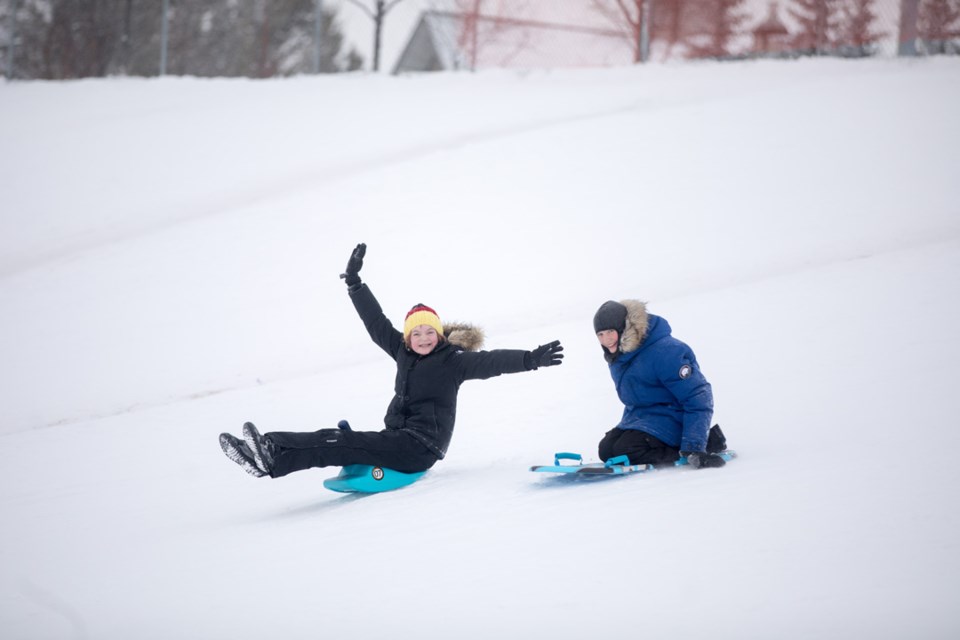The beloved toboggan hill at Dr. Morris Gibson School will be rather quiet during recess this year, as the insurance provider for Foothills School Division (FSD) has prohibited sledding during school hours.
An email sent to parents on Dec. 2 explained that FSD had their insurance rates increase substantially and with those increases have come amended policies.
“Among the changes that affect Dr. Morris Gibson is that our divisional insurer has prohibited, ‘tobogganing, tubing, crazy carpet, bobsledding and sledding on a slope of greater than five metres in height or with an incline of greater than 35 degrees,’” the email said, in part. “Our hills exceed these limits, and we are working together to provide our students with different activities during the winter months to keep everyone active and warm.”
David Small was one of many parents who received the email this morning and was frustrated by the news.
“We’re going through COVID right now, the kids have already got so much stuff pulled away,” he said.
Sledding on the hill has been deemed a red activity by the division’s insurance provider, Alberta Risk Managed Insurance Consortium (ARMIC).
Activities are placed into three categories — green, amber and red.
Green activities are approved activities that must follow board policies and administrative procedures, as well as Safety Guidelines for Physical Activity in Alberta Schools. Amber activities have the potential for unreasonable risk and must be reviewed by the school’s principal and reviewed against the aforementioned provincial guidelines. Red activities are prohibited.
FSD manager of risk and materials Dave Barton said activities are placed into categories based on payouts resulting from incidents in the past.
Other activities designated as red by the company include axe training, bungee jumping, excursions to natural disaster areas and war zones, pyrotechnics and more.
Barton said the categorization is not specifically about the school’s snow hill, but it's dimensions.
To his knowledge, there has not been a serious injury associated with the hill during his time in the position.
“I can’t say that we’ve ever had one, but it’s only what gets reported that I would know,” Barton said.
Closing the snow hill during school hours should happen if there is evidence that it’s truly a safety risk, Small said. If not, he doesn’t see a reason why playing on the hill is any different than the playground.
“Maybe there’s been concussions or broken bones, I don’t know,” he said. “If there are, I guess maybe it isn’t an over-exaggerated response, because I don’t want kids to get hurt. If there’s not and it would be no different than a kid climbing on a jungle gym, slipping and falling, getting bumps and bruises or the odd bloody nose — which kids get — then it’s completely ridiculous.”
The school division is in the process of getting clarification from ARMIC, and Barton said he would like to come to a compromise with the company, although he is not sure what that would look like.
“That’s where our question is with the insurers is: How can we say, 'No, you can’t toboggan,' but at 3:30 p.m. when the kids are off, 'have at ‘er?'” he said.
The hill is still open to the town on weekends and weekdays after 4 p.m., according to the email attributed to principal Bobbi Hunter and vice-principal Scott Flintoft.
Ms. Hunter was reached for comment and has yet to provide comment.
If the school wished to undertake a red activity, a series of steps must be followed, said ARMIC:
1. A case must be made to show that the educational benefit(s) to the students participating in the activity outweigh the risk(s) of injury to the students and any associated costs. Strong educational benefits must be realized by students taking part in the activity.
2. The activity is to be approved by the superintendent or designate.
3. Marsh Canada is to perform an independent risk evaluation on the activity and provide the findings to the Risk Management Committee, which will bring a recommendation to the subscribers meeting for approval.
4. Additional liability insurance must be purchased by the ARMIC Member Board to cover the prohibited activity.




